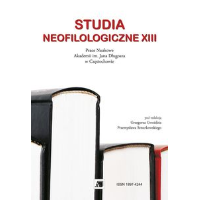Sacrum und Profanum in Thomas Manns Schaffen
Sacrum and Profanum in Thomas Mann’s Writing
Author(s): Jacek KępaSubject(s): Recent History (1900 till today), German Literature, Sociology of Culture, Sociology of Religion
Published by: Uniwersytet Jana Długosza w Częstochowie
Keywords: Thomas Mann; sacrum; profanum; The Magic Mountain; pensive christianism; conservatism;
Summary/Abstract: Thomas Mann considers himself an author of the bourgeoisie. The main characteristic of this lifestyle is the worldview of German Protestantism, which assumes the harmony between sacrum and profanum. The understanding of the bourgeoisie as harmony between these poles became, in Thomas Mann’s writing, the instrument which orders the history of European culture from the Middle Ages to the Twentieth Century. In this understanding the lifestyle of the bourgeoisie is the necessary element of the civilization and culture of the future, since only this lifestyle gives the individual the meaning of life, and in this way the foundation for a healthy society. The maintenance of the heritage of German culture, based on the unity of the spiritual and the secular spheres, was also responsible for the break developed through centuries between the democratizing West and conservative Germany, and became – according to Thomas Mann – the main source for two world wars and totalitarianism. The unity of sacrum and profanum as the highest ideal in life, and at the same time as the basis for the deepest contempt for humanity – these are the contradictions in the work of Thomas Mann
Journal: Prace Naukowe Akademii im. Jana Długosza w Częstochowie. Studia Neofilologiczne
- Issue Year: XIII/2017
- Issue No: 13
- Page Range: 29-48
- Page Count: 20
- Language: German

